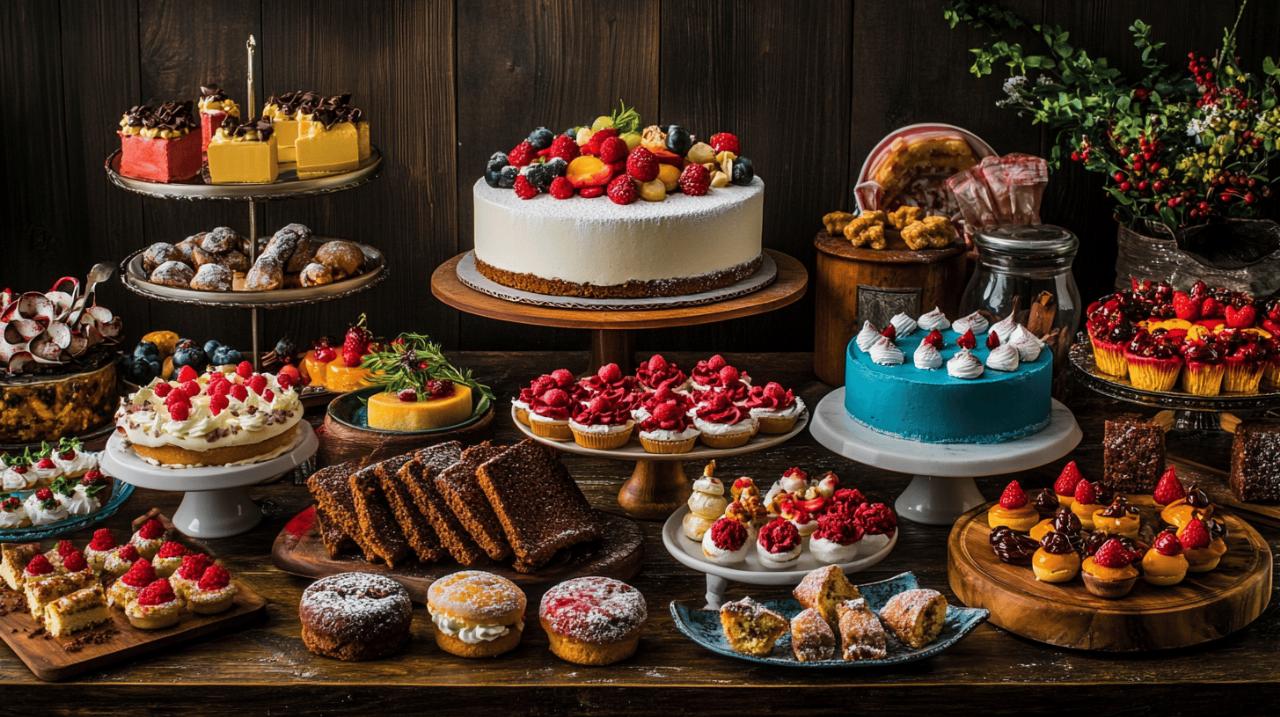Creating delightful sweet specialities at home requires more than just following a recipe; it demands an understanding of the ingredients that transform simple mixtures into extraordinary treats. The journey from a bare pantry to a kitchen filled with the aroma of freshly baked goods begins with selecting the finest components. Whether you are preparing a classic sponge, a batch of biscuits, or an elaborate three-layer cake, the quality of your flour, butter, and flavourings will determine the success of your baking endeavours. This guide explores the essential ingredients that every home baker should have on hand, from the foundation of quality flour to the distinctive touch of bourbon vanilla, ensuring that every creation is nothing short of perfection.
Essential baking ingredients: building blocks of brilliant bakes
Premium flour selection: the foundation of every recipe
Flour serves as the backbone of nearly every baking recipe, providing structure and texture to cakes, biscuits, and pastries. Selecting the right type of flour is crucial, as different varieties offer distinct characteristics that can dramatically alter the outcome of your bake. All-purpose flour, typically weighing around three hundred and twenty-five grams for a standard cake recipe, is a versatile choice that suits most home baking needs. Its moderate protein content strikes a balance between strength and tenderness, making it ideal for everything from light sponges to more robust tea cakes. For those seeking a finer crumb and a more delicate texture, plain flour can be an excellent alternative, particularly when preparing biscuits or shortbread cookies. The key is to measure accurately and handle the flour gently during mixing to avoid overdeveloping the gluten, which can result in a tough, chewy texture rather than the tender, velvety crumb that defines a truly exceptional bake.
Quality butter and fats: creating rich, tender textures
Butter is the heart and soul of many sweet specialities, imparting a richness and depth of flavour that is simply irreplaceable. Unsalted butter, often used in quantities of around one hundred and sixty-eight grams for a standard cake, allows bakers to control the salt content in their recipes more precisely. The quality of butter matters immensely; premium butter with a higher fat content will yield a more tender crumb and a superior mouthfeel. When creamed with sugar, butter incorporates air into the mixture, creating a light and fluffy base that is essential for achieving the perfect rise and texture. Some recipes also call for the addition of vegetable oil, which contributes moisture and helps extend the freshness of baked goods. For those seeking a vegan alternative, products such as Earth Balance buttery sticks can be substituted, though adjustments to salt levels and baking times may be necessary to achieve the desired results. The interplay between butter and sugar during the creaming process is a fundamental technique that every home baker should master, as it sets the stage for the entire baking endeavour.
Flavouring excellence: bourbon vanilla and artisan extracts
The magic of bourbon vanilla: why quality matters
Vanilla is far more than a mere flavouring; it is the essence that ties together the various elements of a dessert, enhancing sweetness and adding a layer of complexity that elevates even the simplest recipes. Bourbon vanilla, named after the island of Réunion, formerly known as Bourbon, is renowned for its rich, creamy flavour profile and aromatic intensity. When selecting vanilla for baking, the choice between extract, beans, or paste can significantly impact the final product. Vanilla extract is the most convenient option, but for a more pronounced flavour, scraping the seeds from two vanilla beans or using three teaspoons of vanilla bean paste can infuse your batter with an unparalleled depth of taste. Some bakers take this a step further by incorporating bourbon whiskey into their recipes, creating a harmonious blend of vanilla and spirit that adds warmth and sophistication. This combination is particularly effective in recipes for buttercream frosting, where the alcohol enhances the vanilla notes without overpowering the delicate sweetness. The quality of vanilla you choose will directly influence the character of your bakes, making it a worthy investment for anyone serious about home baking.
Orange blossom and almond extracts: elevating your creations
While vanilla may be the star of many recipes, other extracts and flavourings play supporting roles that can transform a good dessert into an unforgettable one. Orange blossom water, known as fleur d'oranger, brings a subtle floral note that is particularly popular in French patisserie. Just a few drops can add a fragrant complexity to cakes, biscuits, and buttercream, evoking the sun-drenched orchards of the Mediterranean. Almond extract, on the other hand, offers a sweet, nutty flavour that pairs beautifully with fruit-based desserts and complements chocolate in ways that vanilla alone cannot. When working with these potent extracts, restraint is key; a little goes a long way, and overuse can result in a cloying or artificial taste. The art of flavouring lies in achieving balance, allowing each ingredient to contribute to a harmonious whole rather than competing for dominance. By experimenting with different combinations of extracts and flavourings, home bakers can develop a signature style that sets their creations apart from the ordinary.
Chocolate and Nut Varieties: Indulgent Ingredients for Decadent Desserts
Selecting dark chocolate: from bean to bar
 Chocolate is a beloved ingredient that brings richness and indulgence to countless sweet specialities. Dark chocolate, or chocolat noir, is particularly prized for its intense flavour and lower sugar content, making it a versatile choice for both baking and decoration. When selecting dark chocolate for your recipes, consider the cocoa percentage, as this will determine the balance between sweetness and bitterness. Chocolate with a cocoa content of around seventy percent offers a robust flavour that stands up well to other ingredients without becoming too bitter. For baking, high-quality chocolate that melts smoothly and blends seamlessly into batters is essential. Cocoa powder is another valuable ingredient, providing a deep chocolate flavour without adding extra fat or sugar. It is particularly useful in recipes for biscuits and cakes where a concentrated chocolate taste is desired. Whether you are making a chocolate filling for a layered cake or incorporating cocoa powder into shortbread cookies, the quality of your chocolate will have a profound impact on the final result. Investing in artisan chocolate from reputable producers ensures that your bakes will be as delicious as they are visually appealing.
Chocolate is a beloved ingredient that brings richness and indulgence to countless sweet specialities. Dark chocolate, or chocolat noir, is particularly prized for its intense flavour and lower sugar content, making it a versatile choice for both baking and decoration. When selecting dark chocolate for your recipes, consider the cocoa percentage, as this will determine the balance between sweetness and bitterness. Chocolate with a cocoa content of around seventy percent offers a robust flavour that stands up well to other ingredients without becoming too bitter. For baking, high-quality chocolate that melts smoothly and blends seamlessly into batters is essential. Cocoa powder is another valuable ingredient, providing a deep chocolate flavour without adding extra fat or sugar. It is particularly useful in recipes for biscuits and cakes where a concentrated chocolate taste is desired. Whether you are making a chocolate filling for a layered cake or incorporating cocoa powder into shortbread cookies, the quality of your chocolate will have a profound impact on the final result. Investing in artisan chocolate from reputable producers ensures that your bakes will be as delicious as they are visually appealing.
Working with Almonds: Ground, Flaked, and Whole
Almonds are a staple in many traditional French pastries and add both texture and flavour to a wide range of sweet specialities. Ground almonds, or amandes, are often used in place of some of the flour in cake recipes, resulting in a moist, tender crumb with a subtle nutty taste. They are also the key ingredient in almond paste and frangipane, which are used as fillings in tarts and pastries. Flaked almonds provide a delightful crunch when toasted and scattered over the top of cakes or biscuits, adding visual interest as well as flavour. Whole almonds can be blanched and ground at home for the freshest possible taste, or purchased pre-ground for convenience. When working with almonds, it is important to store them properly to prevent them from becoming rancid, as their high oil content makes them susceptible to spoilage. Keeping almonds in an airtight container in a cool, dark place will help maintain their freshness and ensure that they contribute their best flavour to your baking. The versatility of almonds makes them an indispensable ingredient for anyone looking to create authentic and delicious sweet treats at home.
Regional speciality ingredients: capturing authentic french patisserie
Traditional components for classic french pastries
French patisserie is celebrated around the world for its elegance, precision, and exquisite flavours. Achieving these qualities at home requires not only skill but also access to the traditional ingredients that define classic recipes. Butter, or beurre, is used in generous quantities in French baking, contributing to the rich, flaky layers of croissants and the tender crumb of madeleines. Sugar, or sucre, is another essential component, with both caster and icing varieties playing important roles in different recipes. Eggs provide structure and richness, while milk adds moisture and helps create a smooth, cohesive batter. For those looking to recreate regional specialities such as the Paris-Brest or the Kouign Amman, understanding the role of each ingredient and how they interact is crucial. These pastries often require specific techniques, such as laminating dough or caramelising sugar, which demand both patience and precision. By sourcing high-quality ingredients and following traditional methods, home bakers can bring the flavours and textures of French patisserie into their own kitchens, creating treats that are worthy of the finest Parisian bakeries.
Sourcing authentic ingredients for regional delicacies
Recreating the authentic taste of regional French delicacies at home begins with sourcing the right ingredients. Many of the flavours that define these specialities are linked to specific products that are traditionally used in their preparation. Bourbon vanilla, for instance, is a key ingredient in many classic recipes, providing a depth of flavour that cannot be replicated with synthetic substitutes. Similarly, high-quality butter from regions known for dairy production, such as Normandy, can make a significant difference in the final product. Orange blossom water, often used in pastries from the south of France, adds a distinctive floral note that transports the palate to sun-soaked Mediterranean villages. Dark chocolate from renowned producers and finely ground almonds from artisan suppliers are also worth seeking out for those who are serious about their baking. While it may require some effort to locate these ingredients, the results are well worth it. The internet has made it easier than ever to access speciality products, and many online retailers offer a wide selection of authentic French baking ingredients. By investing in quality components and taking the time to understand their role in traditional recipes, home bakers can create sweet specialities that are both delicious and true to their origins.





